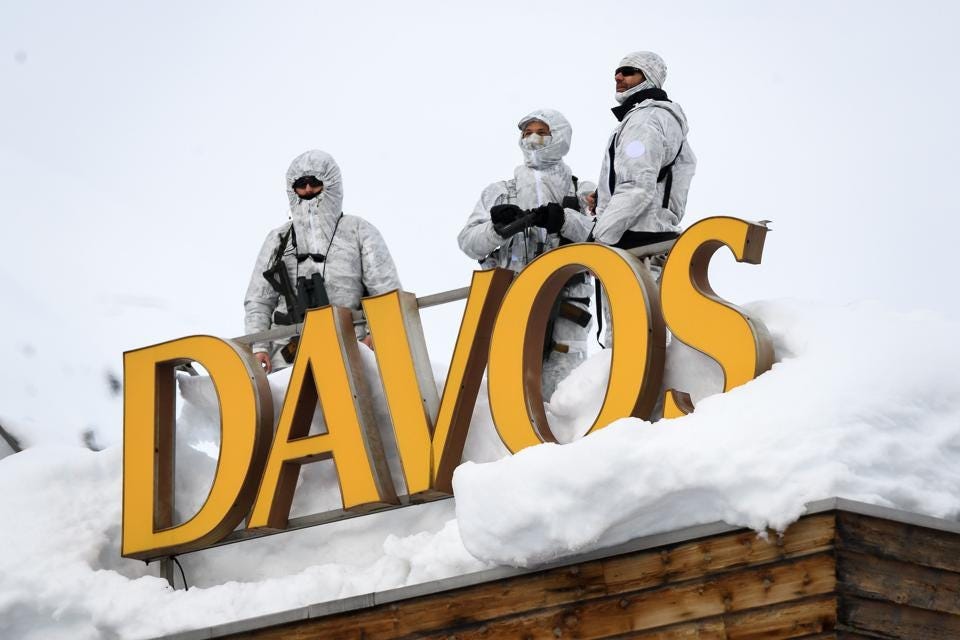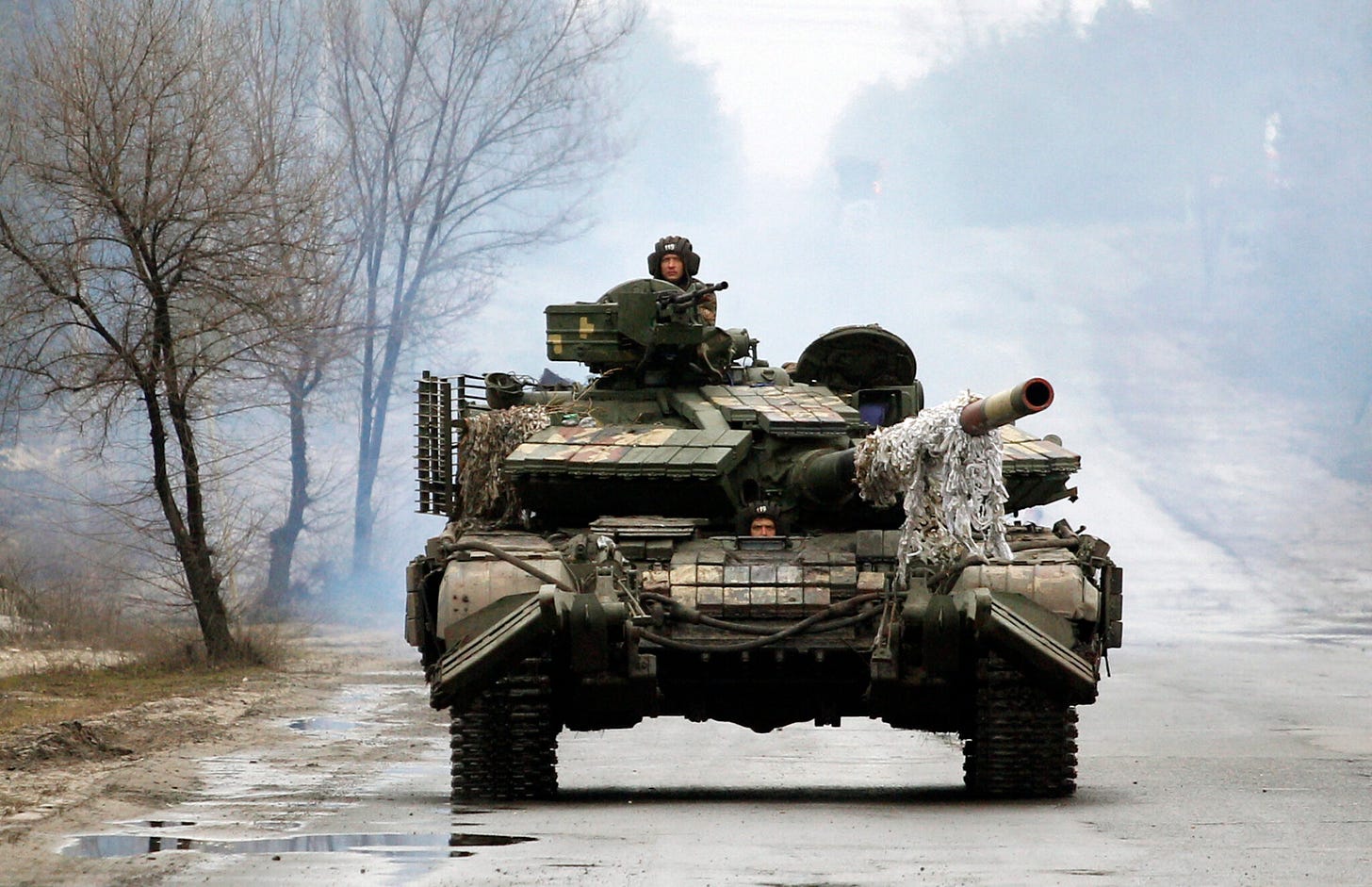At Davos this year, “polycrisis” was all the rage.
For those whose invitations were, like mine, lost in the mail, “polycrisis” is the idea that the world is embroiled in multiple crises that are interdependent. This entanglement makes coping with the crises more difficult. Hence, what may look like a set of separate crises is more like a single crisis made of many crises. A “polycrisis,” if you will.
Writing about the polycrisis recently, the economist Nouriel Roubini rattled off the component crises as he saw them: Stagflation. Globalization retreating. Cold War with China. The risk of more hot wars that could go nuclear or full World. Worsening climate change. “Pandemics, too, are likely to become more frequent, virulent, and costly. Advances in artificial intelligence, machine learning, robotics, and automation are threatening to produce more inequality, permanent technological unemployment, and deadlier weapons with which to prosecute unconventional wars. All these problems are fuelling a backlash against democratic capitalism, and empowering populist, authoritarian, and militaristic extremists on the right and the left.”
The man isn’t called Dr. Doom for nothing.
If you haven’t yet stopped reading and run to your bunker, let me assure you that Roubini is a classic one-armed economist — piling up reasons to tremble but seldom acknowledging countervailing facts. (Old Harry Truman joke: “I want to hear from a one-armed economist because I’m sick of hearing ‘on the one hand, but on the other hand…’”) And his reasoning is occasionally eye-rollingly tendentious. Globalization is retreating, is it? A remarkable array of data says otherwise. Or consider the claim that the threat of “permanent technological unemployment” has contributed to the rise of “populist, authoritarian, and militaristic extremists.” Seems entirely speculative to me. But if you are going to mention it, surely you also need to note that unemployment is extremely low in the United States, Canada, and a number of other countries, and has been for years (aside from the brief surge when Covid hit). But, no. The man has only one arm.
There’s a more basic problem with Roubini’s list. Or any list of crises. As historian Niall Ferguson laconically remarked in a panel discussion at Davos: “That’s just history happening.”
Bad things happen. Bad things threaten to happen. Always.
Name the decade and I will show you smart and accomplished people who got a lot of attention by compiling lists like Roubini’s while hyperventilating into a paper bag. My favourite is the economist Robert Heilbroner. His writings in the 1970s make Roubini sound like a teenager huffing laughing gas.
Heilbroner, needless to say, did not identify the turmoil of his time as a “polycrisis” — a logism that hadn’t yet been neo’d — but he could well have because the crises he identified were often highly interdependent. In fact, he emphasized their interdependence. Many of the specific crises he identified (hot war, Cold War, the threat of nuclear war, the decline of democracy, the rise of authoritarianism, environmental degradation, stagflation) even sound familiar today.
So does “polycrisis” mean anything more than “bad stuff linked to other bad stuff, as usual?”
To test this, we need to look to the writing of the economic historian Adam Tooze, who popularized the term. He’s a serious and respected thinker, one reason why “polycrisis” has caught on while Roubini’s preferred neologism – “megathreats” – has languished.
“A problem becomes a crisis when it challenges our ability to cope and thus threatens our identity,” Tooze wrote recently. “In the polycrisis the shocks are disparate, but they interact so that the whole is even more overwhelming than the sum of the parts…. Things that would once have seemed fanciful are now facts.”
That is a true and accurate summary of the state of the world right now. But how is it new? I can’t think of any decade between now and the late 19th century when Tooze’s description wouldn’t apply. And I only stop at the late 19th century because that’s where my knowledge grows thin.
Tooze is too smart to miss this objection. He raises it himself.
But how new is it really? Think back to 2008-2009. Vladimir Putin invaded Georgia. John McCain chose Sarah Palin as his running mate. The banks were toppling. The Doha World Trade Organization round came to grief, as did the climate talks in Copenhagen the following year. And, to top it all, swine flu was on the loose.
“Former European Commission president Jean-Claude Juncker, to whom we owe the currency of the term polycrisis, borrowed it in 2016 from the French theorist of complexity Edgar Morin, who first used it in the 1990s. As Morin himself insisted, it was with the ecological alert of the early 1970s that a new sense of overarching global risk entered public consciousness.
It’s hard to argue with any of that. But this would seem to suggest that polycrisis is, far from some scary new condition, nothing more than a truism for more than half a century.
Tooze himself seems to concede the point.
So have we been living in a polycrisis all along? We should beware complacency.
The scary new buzzword describes a condition the world has been in for at least as long as I have been alive? That makes it a lot less scary. And I don’t think it’s complacent to say so.
But then Tooze argues that things have indeed changed in important ways more recently.
In the 1970s, whether you were a Eurocommunist, an ecologist or an angst-ridden conservative, you could still attribute your worries to a single cause — late capitalism, too much or too little economic growth, or an excess of entitlement. A single cause also meant that one could imagine a sweeping solution, be it social revolution or neoliberalism.
What makes the crises of the past 15 years so disorientating is that it no longer seems plausible to point to a single cause and, by implication, a single fix. Whereas in the 1980s you might still have believed that “the market” would efficiently steer the economy, deliver growth, defuse contentious political issues and win the cold war, who would make the same claim today? It turns out that democracy is fragile. Sustainable development will require contentious industrial policy. And the new cold war between Beijing and Washington is only just getting going.
I hesitate to say this about the words of a globally respected historian, but this feels an awful lot like hindsight bias.
Yes, ideologues in the 1970s and 1980s had handy ways of seeing various crises as manifestations of a single cause. But that was more a reflection of their own mental models than reality.
Complexity theory started to come into its own in the 1980s and it explained something that had only occasionally been intuited before — that complex, interdependent systems exhibit weirdly non-linear behaviour, such that apparently stable systems can suddenly collapse in disorder, or small changes can mushroom into big effects, making longer-term prediction difficult when it’s not impossible. And if complex systems are entangled with other complex systems…. The days of seeing single causes, linear effects, and simple solutions were over. (Which is why the 1970s was the last hurrah for long-term “strategic planning,” as Henry Mintzberg described in The Rise and Fall of Strategic Planning.)
But complexity theory described the world, it didn’t change it. The 1970s were plenty complex, non-linear, and unpredictable. Consider that in 1973 and 1974 it was widely believed that the Japanese economic miracle was fatally wounded. By what? By something seemingly so remote from Japan as to seemingly have no connection: Arab-Israeli politics (which contributed to the OPEC oil embargo that strangled the Japanese economy.) To those living in that moment, that was surely as bewildering as anything we face today. What complexity! What interdependence! In a world like that, the idea that the crises of the decade could reasonably be seen – that is, seen by non-ideologues -- as having a single cause and a single fix is, well, “a stretch” would be a polite description.
Tooze further argues that the present is different from the past in this way:
Meanwhile, the diversity of problems is compounded by the growing anxiety that economic and social development are hurtling us towards catastrophic ecological tipping points.
Again, true. But that sentence could have been written any time in the last half century. It would not even be surprising to find it in the pages of two highly influential books -- William Vogt’s Road To Survival and Fairfield Osborn’s Our Plundered Planet – published in 1948.
Finally, Tooze sums up:
Modern history appears as a tale of progress by way of improvisation, innovation, reform and crisis-management. We have dodged several great depressions, devised vaccines to stop disease and avoided nuclear war. Perhaps innovation will also allow us to master the environmental crises looming ahead. Perhaps. But it is an unrelenting foot race, because what crisis-fighting and technological fixes all too rarely do is address the underlying trends. The more successful we are at coping, the more the tension builds. If you have found the past few years stressful and disorientating, if your life has already been disrupted, it is time to brace. Our tightrope walk with no end is only going to become more precarious and nerve-racking.
When did global affairs not involve “improvisation, innovation, reform and crisis-management”? When were we not trying to dodge catastrophes? When did people not find “the past few years stressful and disorientating?”
In all the talk of “polycrisis,” I have seen precisely no one mention that hindsight bias all but ensures that the present will feel more precarious than the past no matter what the objective reality is: The past is a movie we have seen. We know how it ends. The present is unmistakably uncertain. And uncertainty is unsettling.
If you’re thinking hindsight only afflicts the ignorant and the naive, think again. Even highly educated, extremely sophisticated observers of international affairs can have their perceptions badly skewed by it — as Phil Tetlock vividly demonstrated in the landmark research laid out in Expert Political Judgment.
If we’re not careful, hindsight bias will cause us to screen evidence with prejudice – accepting what confirms the feeling while sifting out or ignoring whatever challenges it. And we will never be as careful as we must be if we don’t first explicitly name and acknowledge the bias.
The World Economic Forum, for what it’s worth, warned darkly that we should brace for “a unique, uncertain and turbulent decade to come.”
I strongly agree. That is entirely true.
And has been for at least as long as I have been alive.






I do enjoy your critiques of the doomsayers, which does not undermine them entirely, but just likes to point at the often missing limb. Perhaps they need the word "polycrisis," because looking at the world we see every day, much doesn't seem immediately so bad, and the individual crises alone are not able to summon enough fear for these prophets.
I sometimes think that what makes these times unique is the prevalence of unchallenged wild irrationality across all sectors of society -- including supposedly objective ones such as science. Forceful assertions are routinely made and policies put into place with minuscule supporting evidence and sometimes massive contradictory evidence.
There's also a tendency to label every single problem a "crisis". The notion of a "polycrisis" is just the same idea with grade inflation: it's not just a crisis or two; it's a crisis crisis!
But then I think back to the late 1960s and how wildly irrational those times were as well. Somehow we survived as a culture and more-or-less regained our sanity. I hope history repeats itself in that regard.